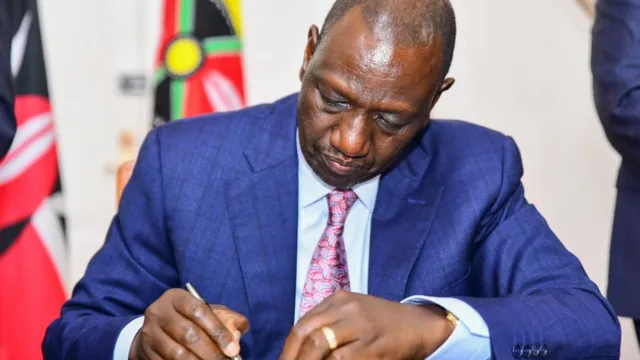President William Ruto has signed into law the Affordable Housing Bill, 2023, paving the way for the reinstatement of housing levy deductions from this month.
The signing ceremony was conducted in State House Nairobi and attended by key government officials.
Employees will now be deducted 1.5 percent of their gross monthly pay, the amount that will be matched by their employer.
Under the new law, Kenyans in the informal sector and others not salaried will pay 1.5 percent of their monthly gross earnings to fund the Kenya Kwanza government’s pet housing project.
The new legislation ropes in workers in the informal sector in order for the regulations to be in agreement with the High Court ruling that rendered it unconstitutional last year.
The legislation received approval from both the Senate and the National Assembly last week and now includes amendments that involve the participation of county governments.
Under the new provisions, proposed by Senate, governors will establish county liaison committees tasked with overseeing the implementation of the affordable housing programme.
Last week President Ruto said that the affordable housing project will not only provide employment opportunities for young people in the country but also ensure there is sufficient land available for agriculture and food production.
“Housing is going to give us jobs for our young people, give us decent living conditions for our people, is going to assist us in making sure that we have land for food production and is also going to make sure that we grow our manufacturing sector,” the President said while speaking in Bomet.
According to the BBC, Kenya’s President William Ruto has signed into law a controversial bill, paving the way for the government to continue collecting a housing levy of 1.5% of a worker’s monthly pay.
The levy is intended to pay for the construction of affordable housing for poorer Kenyans.
But it sparked an outcry from the opposition and a large section of the population who feel burdened by a raft of new taxes.
The law had been held up in the courts.
A judge had stopped the deductions citing lack of a legal framework. However, MPs amended and approved the bill last week despite objections from opposition legislators.
The levy, which had been mentioned in Mr Ruto’s manifesto for the 2022 election, was part of a finance law adopted last June that also doubled the sales tax on fuel. A new higher health insurance levy is also due to come into effect soon.
The government has argued that it needs to increase its revenue from taxation in order to reduce the budget deficit and pay for public services.
The authorities had begun deducting the 1.5% housing levy from peoples’ pay from last July. But, amid public anger, one activist took the government to court arguing successfully that it unfairly singled out Kenyans in the formal sector who get a regular monthly salary.
In order to address the issues raised by the court, the new law now extends the levy to other workers and now requires non-salaried Kenyans in the informal sector to pay the levy.
It is not clear how the government will collect the money from those in the informal sector.
The new law also establishes the Affordable Housing Fund, which is intended to manage the money the government will get from the levy.
The authorities say the deduction will not be backdated to include the money that would have been paid had the scheme not been suspended.
President Ruto is aiming to construct 200,000 affordable housing units every year and hopes to create more than 600,000 jobs.
The opposition has threatened to take this new law to court, alleging the government ignored concerns of Kenyans over the increasing tax burden.
